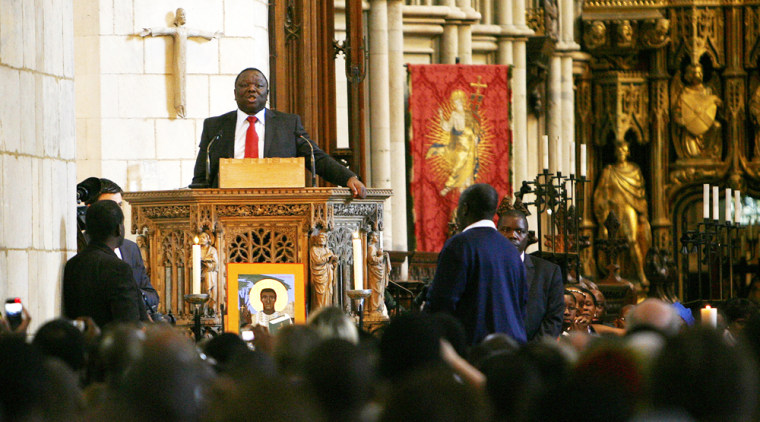Zimbabwean Prime Minister Morgan Tsvangirai on Sunday defended his decision to enter a power-sharing government with President Robert Mugabe, a day after being heckled offstage by protesters in London.
The two bitter rivals joined in a coalition government in February. The move has not gone down well with many Zimbabwean exiles, who blame Mugabe for years of economic collapse and political repression.
Protesters jeered Tsvangirai at a London church Saturday when he appealed to expatriates to return home and rebuild the southern African country.
Tsvangirai told BBC television that Zimbabwe was making progress toward democracy and that free elections would be held in two years.
He said the coalition was "not perfect ... but certainly we are on the way and it's irreversible."
"We went in this government to achieve one thing — it is to achieve ultimately democracy and democratic elections," Tsvangirai said.
He said Mugabe, who has ruled Zimbabwe since 1980, "has already accepted that this is a process of transition and that after two years we should go for an election."
Tsvangirai acknowledged there was a long way to go. Zimbabwe has had the highest inflation rate in the world, most of the population lacks food, human rights abuses persist and thousands have died during a major cholera outbreak.
Many blame Mugabe, and especially a botched land-reform program that saw seizures of white-owned commercial farms.
Tsvangirai said land reform "has been a disaster."
The United States, former colonizer Britain and others want Mugabe to step down, and remain reluctant to offer Zimbabwe major aid. Neighboring countries and an African bank have pledged $650 million in credit lines — far from the $2 billion the government says it needs this year alone.
Tsvangirai said Western governments had moved "from being skeptical to accepting that there is progress; that this progress must be consolidated, that this transition must be strengthened because it strengthens the reform towards a proper democracy."
Tsvangirai, who is on a European tour, is due to meet British Prime Minister Gordon Brown on Monday.
In Zimbabwe, the country's information ministry said Sunday that it is investigating whether a newsletter published by Tsvangirai's office is legal.
The state Sunday Mail newspaper, a mouthpiece of Mugabe's party, says the four-page publication set Tsvangirai on a "collision course" with government colleagues.
The newsletter contains details of Tsvangirai's current trip. The Sunday Mail says Tsvangirai should first have reported to Cabinet colleagues.
Chief information secretary George Charamba is quoted as saying his department is "looking at what the law says."
